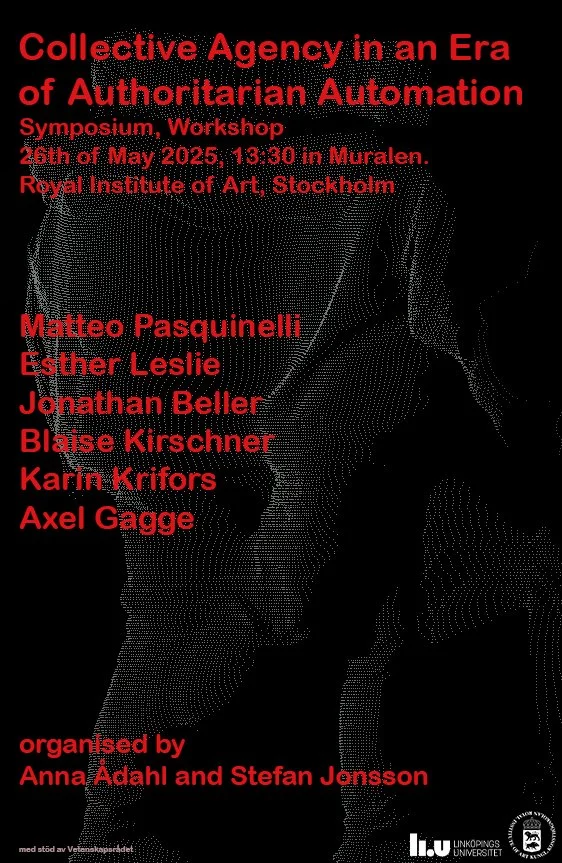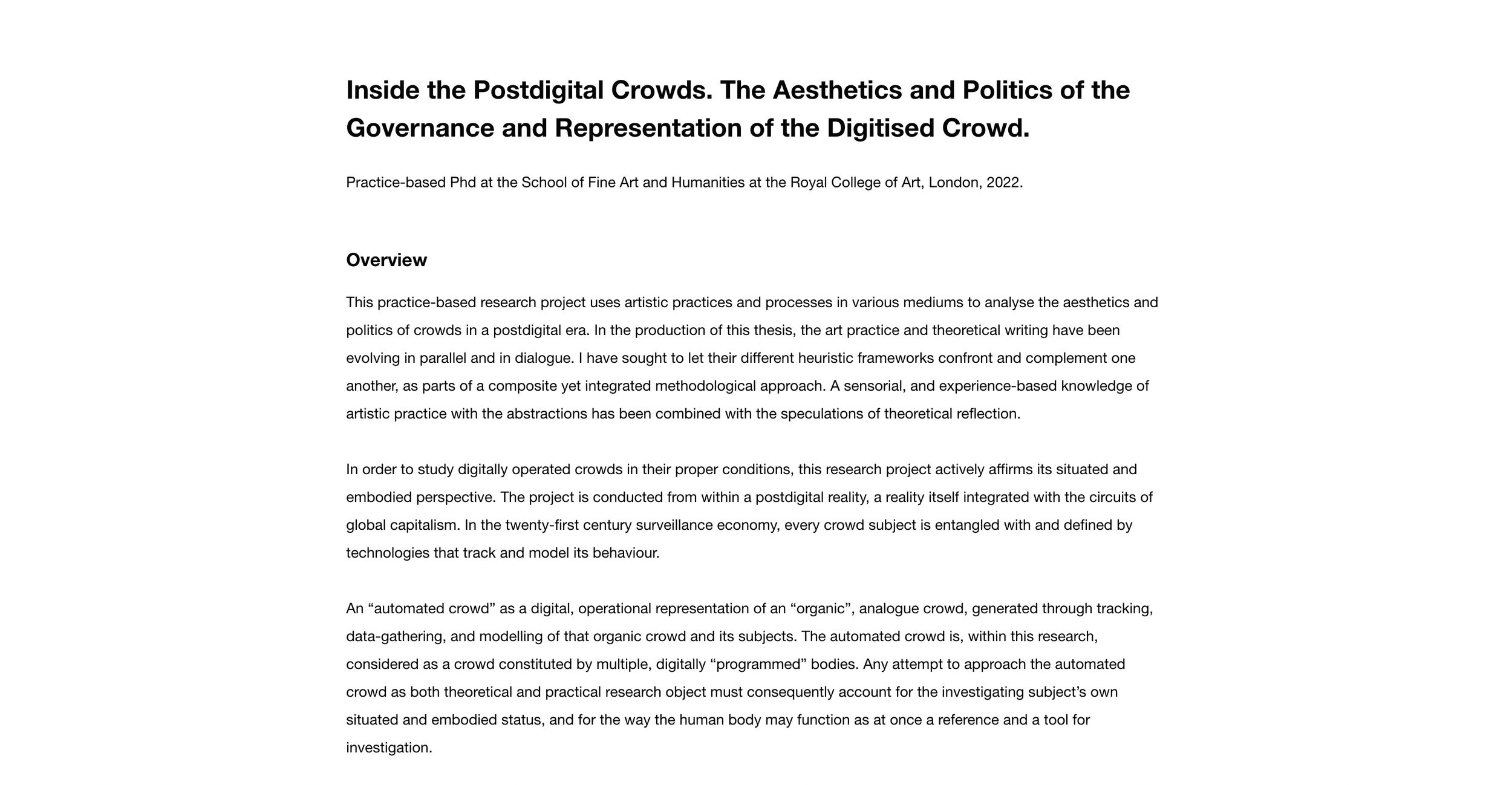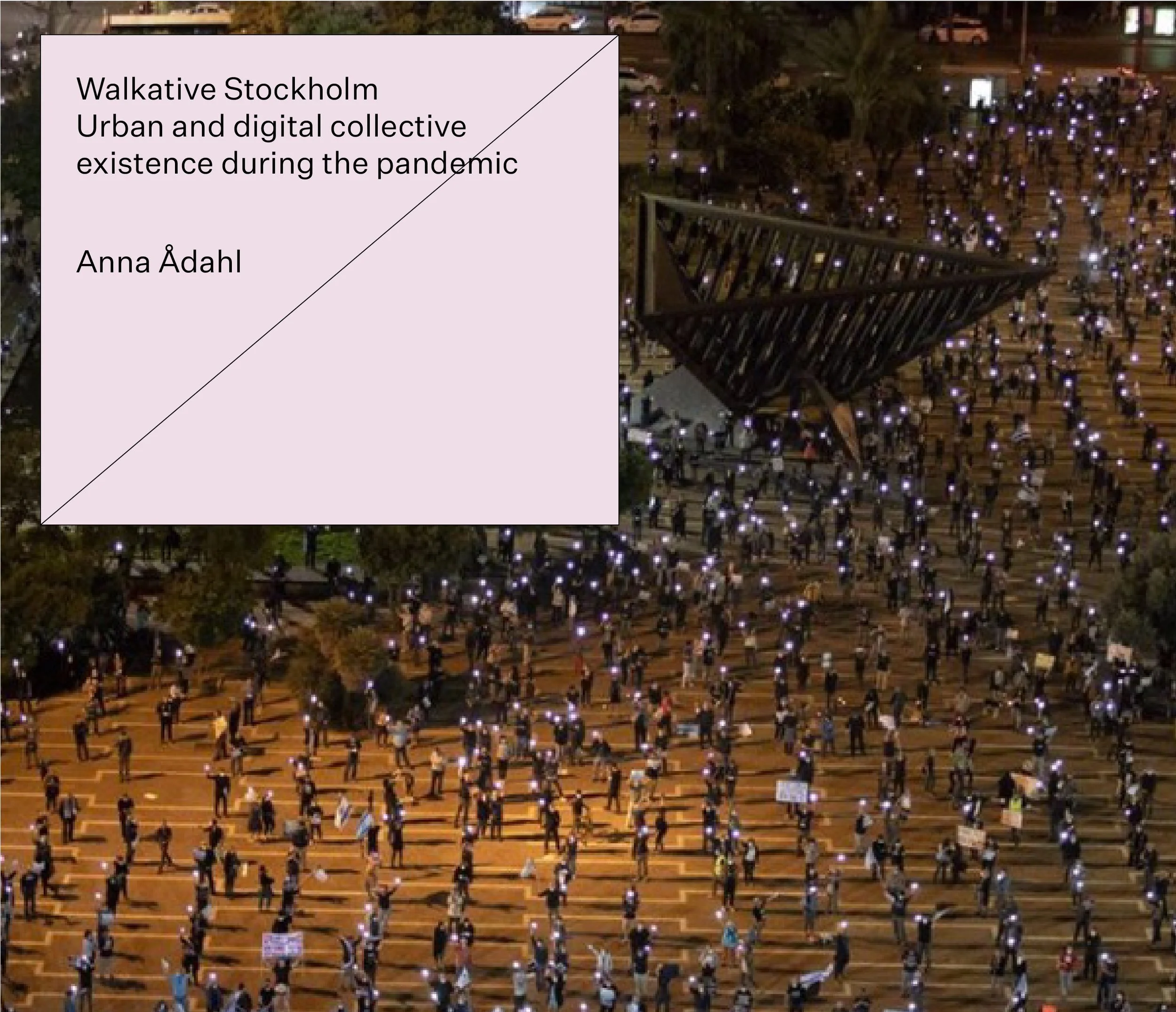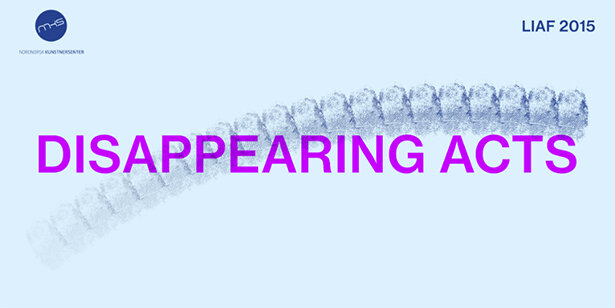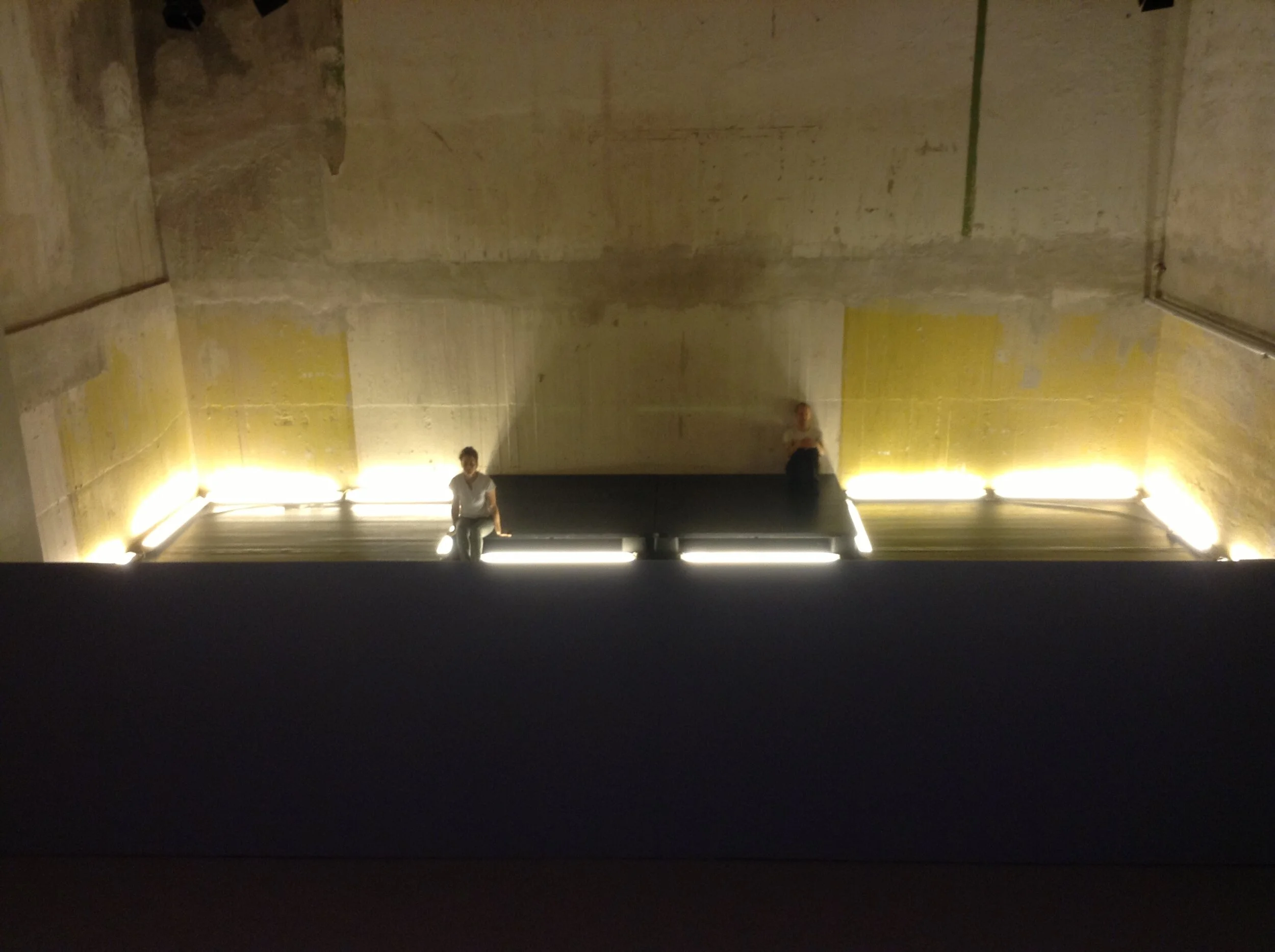2025 —
Collective Agency in an Era of Authoritarian Automation.
Collective Agency website featuring Stefan Jonsson’s and Anna Ådahl’s research and works in progress.
26 May 2025 — Collective Agency in an Era of Authoritarian Automation
Symposium at the Royal Institute of Art, 13:30-18:30, Muralen.
2024 — Walking Cities:
Navigating Post-Pandemic Urban Environments.
Publication edited by — Jaspar Joseph-Lester, Ahuvia Kahane, Simon King and Esther Leslie.
Featuring my contribution, chapter Isolated Together, p.86-102. The book brings together an international group of artists and writers to respond to the question of how our new world order force us to reconsider urban walking and urban spaces…
2023 — SITEzones
Studio conversation about artworks and research linked to my Phd: Inside the Postdigital Crowds. The governance and mediation of the simulated and digitized crowd.
Published 28 DEC 2023
2022 — Phd, Royal College of Art, London, UK
Completed Phd, titled “Inside the Postdigital Crowds”.
2021 — Moderna Muséet Swedish Acquisitions Publication/Catalogue
Featuring work Di-Simulated Crowds (2018). Editor — Art&Theory publishing
2021 — Rencontres Internationales Paris/Berlin at Haus der Kulturen der Welt.
Showing film, The Power of Flow. The Flow of Power (2020).
2021—Moderna Museet, Stockholm, SE
The Modern Museum acquired the film Di-Simulated Crowds, 2018, for their collection. Whatever it is, the way you tell your story online can make all the difference.
2020 — MASS, Pylon Lab, Dresden
Group exhibition with Bogomir Doringer and Clemens von Wedemeyer.
2020 — A Crowded Sky, IMPAKT, Utrecht, NL
Group exhibition with Lawrence Lek, Clemens von Wedemeyer, Tools for Actions, Anna Ådahl, Lantian Xie and Jaebum Kim. Curated by — Jasmin Visser & Stefan Schafer Make it stand out
10 May 2020 — Walkative Stockholm — Urban and digital collective existence during the pandemic
Walking cities in lockdown, Walkative Society, Stockholm, SE
Webinar by Anna Ådahl
Poster by Max Kohler
Organised by Jaspar Joseph-Lester, Simon King, Katharina Siegel and Adalberto Lonardi
2019
The Red Thread / Den Röda Tråden
Public commission for pre-school in Hökarängen, Stockholm, Sweden. Awarded the 1st prize for best collaborative project.
20 May 2019
Workshop/ Conversation on Digital Crowds
With Jeffrey Schnapp (metaLAB, Harvard University) and Dan Hill (Vinnova, Visiting prof at UCL Bartlett IIPP; Adjunct prof at RMIT)
3 - 5 PM, Royal Institute of Technology, Stockholm. Organized by Patrik Svensson
2018
Default Characters
Solo exhibition, Default Characters at Marabouparken Konsthall, Stockholm, Sweden. The show includes six new works produced in 2018.
20 November 2018
Visible and Invisible Crowds
Conversation with Clemens Von Wedemeyer. In the context of seminar, Seminar für Filmwissenschaft, organized/concept by Prof. Dr. Volker Pantenburg.
19:30 in the auditorium, Freie Universität, Berlin
4 May 2018
And or Or
Video documentation from performance, And or Or at Marabouparken Konsthall, Stockholm. Within the context of my solo exhibition Default Characters which lasted between the 4 May — 26 August 2018.
Performers — Rebecca Chentinell, Pär Andersson, Andrea Svensson and Sybrig Dokter
3 July 2018
Vision's Bleeding Edge:
On nonhuman vision, liquid and crystal intelligence and AI
Symposium at the Royal College of Art.
With Esther Leslie (Professor of Political Aesthetics at Birkbeck) and Joanna Zylinska (Professor of New Media and Communications at Goldsmiths) & performances and videos by Anna Adahl, Anja Kirschner, Lawrence Lek, Mayra Martin Ganzinotti, Anna Nazo, Emma Somerset Davis and Adam J B Walker.
Vision’s Bleeding Edge is organised by SOAH Research Students Anja Kirschner, Mayra Martin Ganzinotti, Anna Nazo, Emma Somerset Davis and Adam J B Walker with Aura Satz (Moving Image Tutor and Reader in Fine Art at the Royal College of Art.)
23 June 2018
Default Character
Video Default Character will be screened at Haus der Kulturen der Welt in Berlin at 19:00.
Within the context of the Rencontres Internationales Paris/Berlin 2018.
Interview in Kunstritikk about my show Default Characters at Marabouparken Konsthall. Written by Frida Sandström.
1 April 2018
Crowded Exercises II
The video Crowded Exercises II is shown within the exhibition Konstväxlingar in the Stockholm Underground station Skanstull, Stockholm. On view till 30 June, 2018.
19-21 October 2017
1917-2017: Hundred Years of Russian Revolution in Art and Aesthetics
Conference by Södertörn University at Moderna Museet, Stockholm. Showing film To New Horizons, 2013 within the context/program of the conference.
Article in the Swedish newspaper, Svenska Dagbladet on Default Characters at Marabouparken Konsthall, by Thomas Olsson.
Upcoming solo exhibition at Haninge Konsthall, Stockholm. Exhibition includes older works and a new AR project, Remergence, 2018. The show is on view till 7 September, 2018.
16 June 2018
To New Horizons / Mot Nya Horisonter
The film Default Character will be screened in Les Rencontres Internationales in Paris at 2PM at Le Carreau du Temple.
12 April 2018
Default Character
The film, Default Character is shown within the context of Night of Philosophy at Moderna Muséet, Stockholm.
17 June 2017
Default Character
24 November 2016
Anna Ådahl: Inside The New Massornament
An evening showcasing works by Swedish artist film-maker Anna Ådahl at Whitechapel Gallery, London, UK.
17 September 2016
Lectures and panels at IASPIS & Royal Art Institute, Stockholm
Iaspis Open house 17 Sept 2016 | 18:00
Panel discussion about the future of IASPIS together with Daniel Birnbaum, Sara Arrhenius, Magdalena Malm, Olav Westphalen and Mats Hjelm. Lecture and seminar about my research at the Royal Art Institute within the context of Mejan Assembly - Picturing National Identity/Modernity other speaker was Georgios Papadopoulos.
2016
Kalbjerga Film Festival
Kalbjerga Film Festival located on Fårö/Gotland, Sweden, focuses on silent film with live music performance, with arc-lamp projectors from the 1940´s.
19 September 2015
Museum of Public Objects
Inauguration of public commission, Museum of Public Objects for Stora Arkens square in Haninge, Stockholm, Sweden.
New video of performance, Russian Dancers within the program Kalas på Bord, Moderna Museet in Stockholm.
Video documentation of performance Russian Dancers, 2016, dancer — Rebecca Chentinell. Based on extracted gestures from Öyvind Fahlström´s unpublished novel Russian Dancers from 1953. The event includes readings, film, performances, animals, and organic materials. Other contributors include Anna Hallberg, Johannes Heldén, Cecilia Grönberg, Jonas (J) Magnusson, Jörgen Gassilevski
17 September 2016
Russian Dancers
Participating in Nanjing International Arts Festival, 2016, amongst 315 other artists.
Curators — Lu Peng and Letizia Ragaglia.
12 November 2016
HISTORICODE: Scarcity and Supply
The video Crowded Excercises I, 2015 will be exhibited in the show OEI Strata at INCA Seattle, WA, USA. Exhibiting till 22 February 2016
29 January 2016
Anna Ådahl, Impossible Image, 2015
Article by Charlotte Blanche Myrvold
”Det er et veldig, veldig fint kunstverk. Det er et svart bord, på den ene siden er det enstor haug med masse sand, på den andre siden er det bitte litt sand og en slags maskin med enkamera-aktig ting som lyser på en skjerm. Og på den skjermen er det noen store steiner, men desteinene er egentlig de bitte små sandkornene som er blitt forstørret. Større enn hodet mitt.Og det er spennende. Wow!”
25 September 2015
En 8-årings guide til LIAF
Article in Hyperallergic, written by Karen Gardiner. Featuring work, Impossible Image, 2015 in Biennale: Lofoten International Arts Festival, Lofoten, Norway.
Article in ArtReview Vol 6. #7
Written by Oliver Basciano
28 August 2015
Disappearing Acts, Lofoten International Arts Festival
6 June 2015
Common Patterns
Solo exhibition Common Patterns at the CCA Derry-Londonderry in Northern Ireland. Opening 6 June 2015.
The performance Impossible Homeostasis will be shown at Hordaland Art Centre, Bergen.
September 2013
Impossible Homeostasis
Interview about my work and the performance Impossible Homeostasis at FRAC Champagne-Ardenne, Reims.
Article in French magazine Le Grand Bag, nr.7
Group show with Anna Ådahl, Donatella Bernardi, Jagna Ciuchta, Lukas Hoffmann, Kapwani Kiwanga, VaclavMagid, François Mazabraud.
Galerie De Roussan
47 rue Chapon, 75003 Paris
Opening September 5th
Exhibition: 05.09 - 31.10.2015
5 September 2015
La vérité des apparences - histoires de symboles, de motifs et de langage
Exhibition images of the work, Impossible Image at the 2015 Biennale: Lofoten International Arts Festival in Lofoten, Norway.
September - October 2015
Titled Disappearing Acts, LIAF 2015 will take its thematic basis on ideas of human agency disappearing through the processes of history, ecology, and technology. Organised as a large-scale group exhibition in the Jern & Bygg premises in Svolvær, Disappearing Acts will feature works by 24 artists, including 11 new commissions.
Curated by Matt Packer and Arne Skaug Olsen
Starting 2014, I will be on a one year residency in London with IASPIS at Cubitt and ACME residencies.
September 2014
One Year Residency in London
Toril Johannessen´s selection of the best shows of the year Nordic online magazine, Kunstkritikk
16 December 2013
16. desember — Toril Johannessen
2013
The Exhibited
Article, Orons Kattöga on performance/ installation,The Exhibited in magazine Vagant, Nr. 2, Norway.
Written by Joni Hyvönen.
May 2013
New documentation video of The Exhibited performance/installation at WELD in Stockholm.
Article, Att stjäla horisonten in film magazine Walden. Written by Joni Hyvönen.
Performance/installation of Impossible Homeostasis at FRAC Champagne-Ardenne/Reims Scènes
d´Europe.
The installation Public Matter in the Cube at Fittja Open, Botkyrka Konsthall, Sweden. Exhibited till the 20th of October 2013.
21 September 2013
Curated exhibition, Model of Continuation by Lina Selander, OEI Colour Project, Stockholm Conversation between Lina Selander, Anna Ådahl and Cecilia Grönberg.
14 September 2014
Curator for exhibition, Model of Continuation
Documentation of project To New Horizons in the exhibition Michael was just the beginning/To New horizons.
2013

